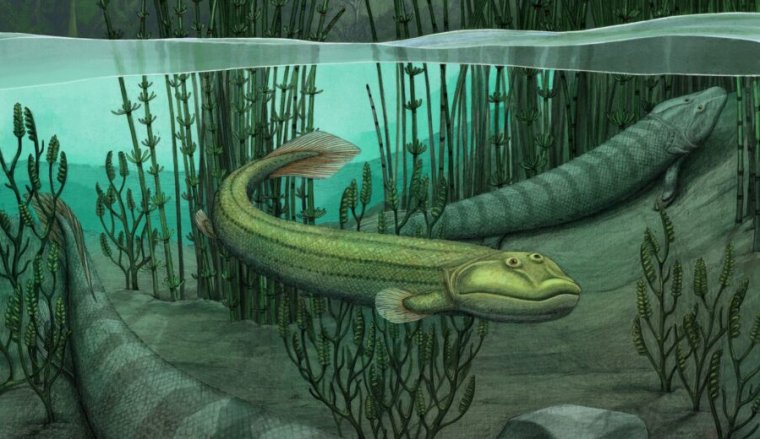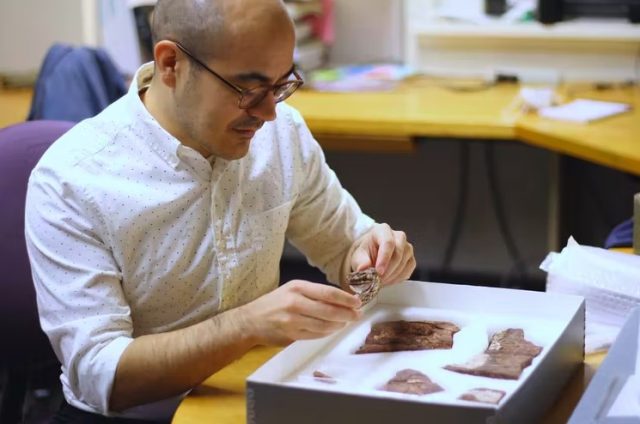

Meet Qikiqtania, a fossil fish with the good sense to stay in the water
source link: https://arstechnica.com/science/2022/07/meet-qikiqtania-a-fossil-fish-with-the-good-sense-to-stay-in-the-water/
Go to the source link to view the article. You can view the picture content, updated content and better typesetting reading experience. If the link is broken, please click the button below to view the snapshot at that time.
early tetrapod —
Meet Qikiqtania, a fossil fish with the good sense to stay in the water
Fossil provides glimpse of lifestyles among fishes during water-to-land transition.
Thomas Stewart, The Conversation - 7/20/2022, 6:57 PM

Approximately 365 million years ago, one group of fishes left the water to live on land. These animals were early tetrapods, a lineage that would radiate to include many thousands of species including amphibians, birds, lizards, and mammals. Human beings are descendants of those early tetrapods, and we share the legacy of their water-to-land transition.
But what if, instead of venturing onto the shores, they had turned back? What if these animals, just at the cusp of leaving the water, had receded to live again in more open waters?
A new fossil suggests that one fish, in fact, did just that. In contrast to other closely related animals, which were using their fins to prop their bodies up on the bottom of the water and perhaps occasionally venturing out onto land, this newly discovered creature had fins that were built for swimming.
In March 2020, I was at The University of Chicago and a member of biologist Neil Shubin’s lab. I was working with Justin Lemberg, another researcher in our group, to process a fossil that was collected back in 2004 during an expedition to the Canadian Arctic.
From the surface of the rock it was embedded in, we could see fragments of the jaws, about 2 inches long (5 cm) and with pointed teeth. There were also patches of white scales with bumpy texture. The anatomy gave us subtle hints that the fossil was an early tetrapod. But we wanted to see inside the rock.
AdvertisementSo we used a technology called CT scanning, which shoots X-rays through the specimen, to look for anything that might be hidden within, out of view. On March 13, we scanned an unassuming piece of rock that had a few scales on top and discovered it contained a complete fin buried inside. Our jaws dropped. A few days later, the lab and campus shut down, and COVID-19 sent us into lockdown.
The fin revealed
A fin like this is extremely precious. It can give scientists clues into how early tetrapods were evolving and how they were living hundreds of millions of years ago. For example, based on the shape of certain bones in the skeleton, we can make predictions about whether an animal was swimming or walking.
Although that first scan of the fin was promising, we needed to see the skeleton in high resolution. As soon as we were allowed back on campus, a professor in the university’s department of the geophysical sciences helped us to trim down the block using a rock saw. This made the block more fin, less rock, allowing for a better scan and a closer view of the fin.
When the dust had cleared and we’d finished analyzing data on the jaws, scales, and fin, we realized that this animal was a new species. Not only that, it turns out that this is one of the closest known relatives to limbed vertebrates—those creatures with fingers and toes.
We named it Qikiqtania wakei. Its genus name, pronounced “kick-kiq-tani-ahh,” refers to the Inuktitut words Qikiqtaaluk or Qikiqtani, the traditional name for the region where the fossil was found. When this fish was alive, many hundreds of millions of years ago, this was a warm environment with rivers and streams. Its species name honors the late David Wake, a scientist and mentor who inspired so many of us in the field of evolutionary and developmental biology.
Page:
Recommend
About Joyk
Aggregate valuable and interesting links.
Joyk means Joy of geeK
